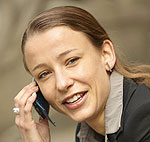I am arriving tomorrow / The train leaves on Thursday
Future arrangements: present continuous and present simple
Present simpleWe often use the present simple to talk about timetables or fixed itineraries.
- I start my course in February.
- The train leaves on Thursday.
Present continuous
The present continuous future is used for arrangements made with another person.
- Betty and I are getting married. (= This is definite and arranged.)
Compare this to the going to future, which is used for decisions and plans.
- I'm going to get married one day. (= This is an intention of mine.)
1. Future events.
Find eight sentences in the emails that mention future events.
For example: I'm coming to Istanbul next week.
Drag the sentences into the box. Do not include suggestions.
2. Future events.
There are two types of future events in the emails – arrangements and scheduled events.
Arrangements are plans you make, usually with other people.
I'm having dinner with people from the meeting.
Scheduled events are part of a programme or timetable. They include travel times and business meetings.
I arrive on Thursday afternoon.
Drag the future events to the correct box.

3. Arrangements.
You use am/are/is + -ing to talk about arrangements.
I'm coming to Istanbul next week.
We're having dinner with Gill on Friday.
Complete the conversation with am, are or is. Use contractions if possible.
Now listen to the conversation.
4. Arrangements.
Linda and Hilary chat about their arrangements. Complete Hilary's sentences with an -ing word.
5. Scheduled events.
You use the present simple to talk about scheduled events, for example, business meetings and travel times.
I arrive on Thursday afternoon, and I leave on Monday.
The meeting's on Friday.
For more information about the present simple see the Grammar Reference.
Complete Hilary's email. Write the verbs in the correct form.
be have arrive start start get leave finish
For more information about future forms see the Grammar Reference.